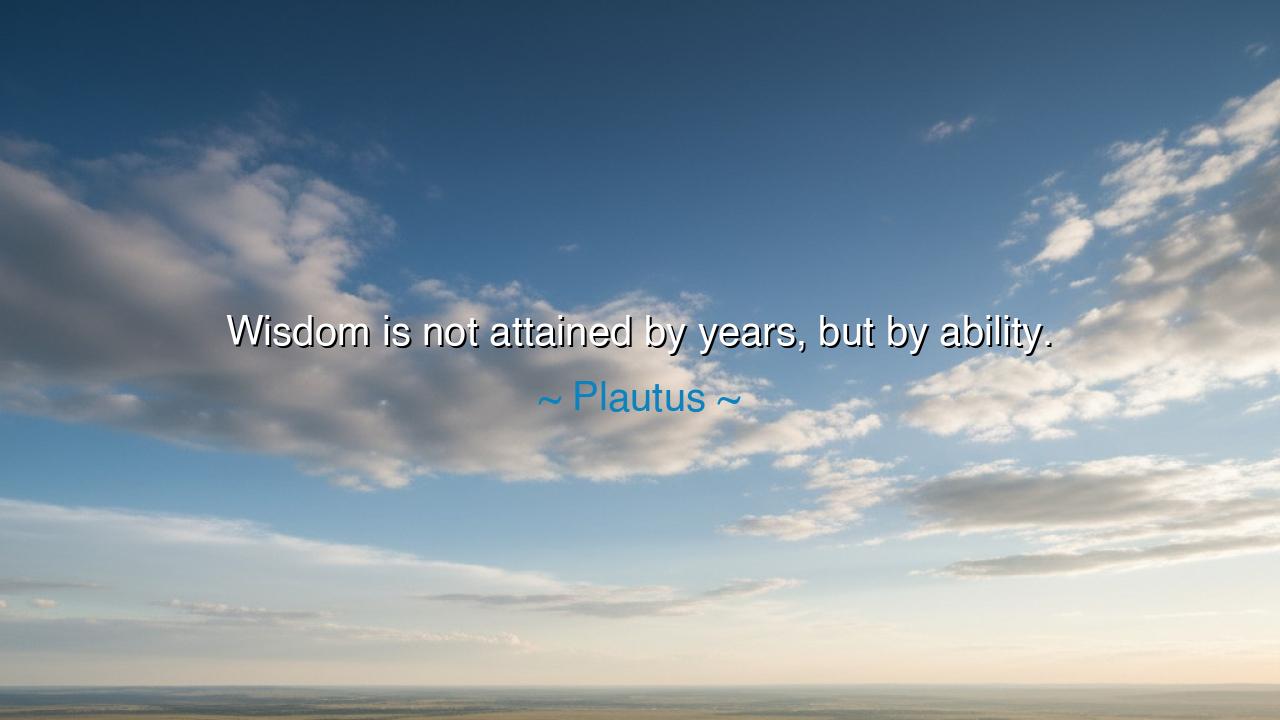
Wisdom is not attained by years, but by ability.






The Roman playwright Plautus, who gave laughter and truth to his people through the stage, declared with piercing clarity: “Wisdom is not attained by years, but by ability.” In this saying, he strikes against the illusion that age alone makes a person wise. Time may wrinkle the skin and whiten the hair, but if the soul has not sharpened itself through reflection, courage, and judgment, then years are nothing but shadows. True wisdom is not the gift of time—it is the fruit of ability, the inner power to learn, discern, and act rightly.
The origin of this thought lies in the bustling streets of ancient Rome, where Plautus observed both the follies of the young and the stubbornness of the old. He knew that some youths, though tender in years, possessed a depth of ability—keen judgment, quick wit, and moral strength—that far surpassed their elders. Conversely, there were gray-haired men whose lives of indulgence and folly had taught them nothing. Thus, he proclaimed that wisdom is not measured in birthdays, but in the capacity of the mind and spirit.
History offers us the shining example of Alexander the Great. At only twenty years of age, he inherited his father’s throne, and by thirty he had conquered much of the known world. He stood before seasoned generals and elder kings, yet his ability—his vision, strategy, and daring—gave him an authority far beyond his years. His story proves Plautus’s claim: wisdom is not guaranteed by time, but by the skill and capacity of the one who seizes it.
The ancients themselves often spoke of this truth. The Greeks honored Athena, goddess of wisdom, who sprang forth fully formed, not aged and wrinkled but young and radiant, showing that wisdom is born from insight, not merely from the passage of time. The Stoics taught that a single moment of clarity can make a man wiser than decades of wandering. Thus, the measure of life is not how long one lives, but how deeply one learns.
Therefore, O seekers, do not wait upon the slow march of years, thinking they alone will bring you wisdom. Cultivate your ability—to see with clarity, to act with courage, to learn with humility. For a youth with sharpened judgment is wiser than an elder lost in folly, and a short life lived with discernment is richer than a long one squandered. Let this be your lesson: wisdom is not the crown of age, but the reward of ability.






VC10CT2-03- Phan Van Chanh
This quote feels both empowering and humbling. Empowering because it suggests that anyone, regardless of age, can become wise if they cultivate the right mental abilities. Humbling because it implies that longevity doesn’t guarantee understanding. It makes me think about how wisdom might depend on curiosity and adaptability—traits that can fade with age if we’re not careful. How can people ensure they keep that ability alive throughout their lives?
LNMinh Le Nguyet
Reading this, I feel it questions society’s automatic respect for elders as the keepers of wisdom. It’s a reminder that maturity doesn’t always accompany age. Still, I wonder—does age at least provide the opportunity for wisdom, even if not everyone takes it? Perhaps wisdom comes from reflection, not just experience itself. I’d love to hear whether Plautus meant that ability alone surpasses all life experience or that both are intertwined.
MNminh nghia
I find this statement intriguing because it separates wisdom from time. If wisdom depends on ability, what kind of ability is Plautus referring to? Is it self-awareness, perception, or judgment? It seems like he’s saying that not everyone grows wiser just by aging—they have to actively develop the capacity to learn. That makes me wonder whether wisdom is more of a skill to practice than a gift that naturally unfolds.
DLDiem ly
This quote challenges the common belief that wisdom automatically comes with age. I’ve met plenty of older people who repeat the same mistakes, and younger ones who seem far more insightful. Maybe experience doesn’t equal understanding—it’s how we process experience that matters. Do you think some people are simply more capable of learning from life because of their mindset or emotional intelligence rather than the number of years they’ve lived?